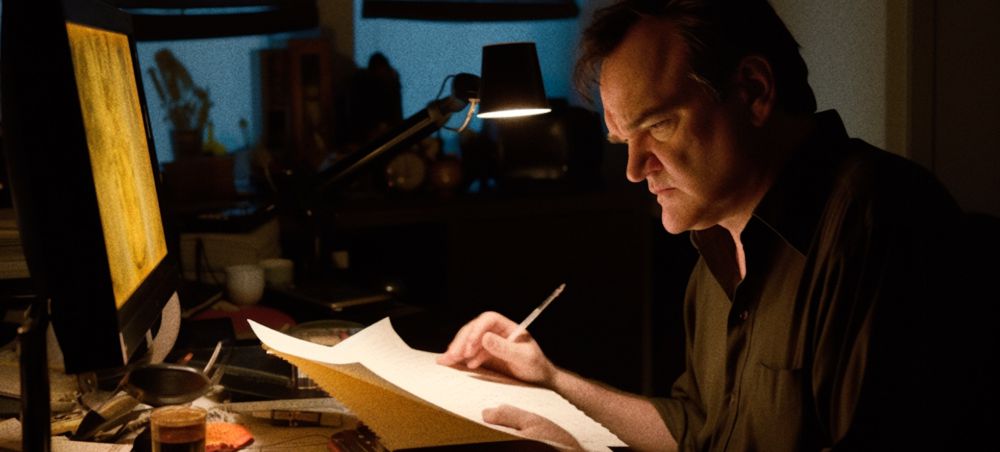
The Tarantino Effect: More Than Just Blood and Swearing
Quentin Tarantino, the man, the myth, the legend. Known for his unpredictable violence and masterfully crafted scenes, he's the guy who can make a 10-minute dialogue scene feel like a rollercoaster ride. And yet, you're still sitting there, glued to your seat, popcorn in hand, thinking, "I didn't sign up for a TED Talk," but you're hooked, and you can't look away.
High Stakes: The Tarantino Recipe for Tension
Tarantino's secret sauce? High stakes. He's like a poker player who goes all in on every hand. In "Kill Bill Vol 2," The Bride steps into the room, and you can cut the tension with a Hattori Hanzō sword. Will she finally get her revenge, or will she stumble at the finish line? It's like watching the season finale of your favorite reality TV show, but with more blood and less roses.
The Art of the Monologue: Tarantino's Three-Act Structure
Tarantino's monologues are like mini movies within the movie. They have a beginning, a middle, and an end. It's like he's serving you a three-course meal, but instead of food, it's words. Delicious, tension-filled words.
In "Kill Bill's" final scene, The Bride wants to kill Bill (spoiler alert: it's in the title). Bill shoots her with truth serum, and then we get the infamous Superman speech. It's like he's a villainous motivational speaker, revealing insights into her true character. The scene ends with The Bride's realization that she's a born killer, and no suburban life could change that. It's like a twisted version of a self-help book, but instead of finding your inner peace, you find your inner assassin.
Stories: Tarantino's Secret Weapon
Tarantino loves stories. He's like that friend who always has a crazy anecdote to share at parties. His characters often engage in seemingly inconsequential conversations that serve a purpose within the story. It's like he's a magician, distracting you with one hand while performing the trick with the other.
Take the opening scene of "Reservoir Dogs." The characters discuss a Madonna song, and it's like you're eavesdropping on a group of friends at a diner. It's relatable, it's humorous, and it draws you in.
The Power of Delay: Building Suspense with Anecdotes
Tarantino also uses anecdotes to delay the inevitable and build suspense. It's like he's a master chef, slowly simmering the plot until it reaches a boiling point. In "Pulp Fiction," Jules shoots Brett after a lengthy monologue. We know what's going to happen, but Tarantino draws it out, making us more engaged with the film for longer. It's like waiting for a kettle to boil, but instead of tea, you get a gunshot.
Tarantino's storytelling is at the top of its game. He's like a chess player, carefully planning each move to build tension, develop character, and dig deep into the movie’s themes. His scenes are not just scenes; they're masterclasses in filmmaking.
The Epiphany: Embrace the Tarantino in You
So, what can we learn from Tarantino? Don't be afraid of long scenes. Embrace the dialogue. Use tension, structure, and anecdotes to keep your audience hooked. And most importantly, remember that every scene, every line, every word matters.
It's not just about what's happening on the surface, it's about what's happening underneath. It's about the subtext, the tension, the stakes. It's about taking your audience on a journey, keeping them on the edge of their seats, and leaving them wanting more.
In the immortal words of Tarantino himself, "I want to top expectations. I want to blow you away." So, whether you're a writer, a filmmaker, or just a fan, let's take a page out of Tarantino's book. Let's aim to top expectations. Let's aim to blow people away. Because at the end of the day, isn't that what storytelling is all about?
So, the next time you find yourself writing a scene, ask yourself: What would Tarantino do? And remember, it's okay to be a little unpredictable, a little violent, and a lot dialogue-heavy. After all, it's worked pretty well for him.
Now, if you'll excuse me, I have a sudden urge to watch "Pulp Fiction" and analyze every single line of dialogue. Happy writing!